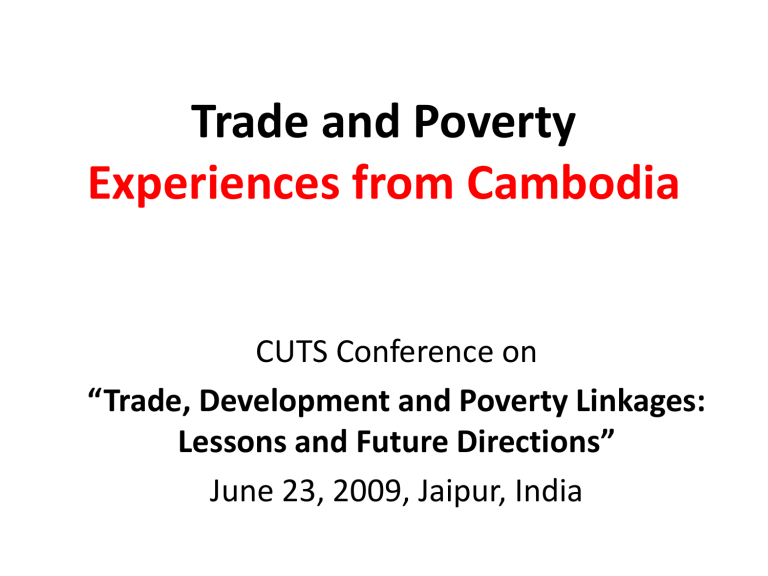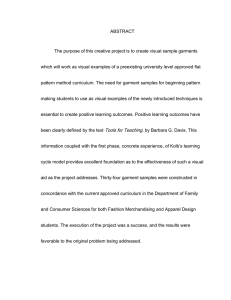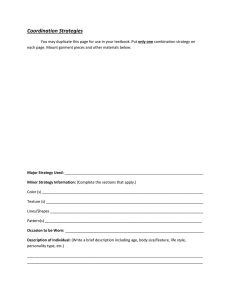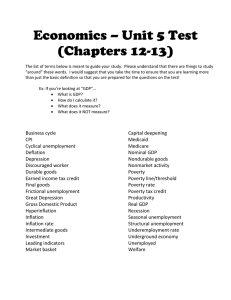Trade and Poverty Experiences from Cambodia CUTS Conference on

Trade and Poverty
Experiences from Cambodia
CUTS Conference on
“Trade, Development and Poverty Linkages:
Lessons and Future Directions”
June 23, 2009, Jaipur, India
Content
1. Overview on Cambodia Economy
2. Overview on Cambodia Trade
3. Linkage between Trade and Poverty
– Experiences from Cambodia garment trade
– Experiences from Cambodia tourism trade
– Experiences from Cambodia agricultural trade
4. Challenges ahead
1.1. Overview on Cambodian Economy
• Double digit growth during last 4 years (2004-2007)
– Fast growing sectors: Garment export, Tourism trade services,
Construction
– Other sectors grew at a moderate rate
• 2008 GDP growth = 5.2 percent
• 2008 GDP = US$10.3 billion
• 2008 GDP per capita = US$703
1.2. Cambodian Economic Growth
Agriculture
Paddy
Industry
Garments
Construction
Services
Tourism
Total GDP
Non Agriculture GDP
2004
-1.0%
-12.2%
17.0%
24.9%
13.2%
13.2%
23.4%
10.3%
15.8%
2005
15.5%
43.7%
12.9%
9.2%
22.1%
13.1%
22.3%
13.3%
12.3%
2006
5.5%
4.3%
18.4%
20.4%
20.0%
10.1%
13.7%
10.8%
13.0%
2007
5.1%
7.5%
8.4%
10.0%
6.7%
10.2%
10.3%
10.2%
12.2%
Source: NIS and EIC
2008e
4.8%
3.6%
3.1%
2.0%
3.0%
6.7%
5.7%
5.2%
5.4%
1.3. Cambodia’s Economic Growth 2008
(Selected Sectors)
0%
-5%
-10%
-15%
-20%
20%
15%
10%
5%
Crops Textile Tourism Real Estate GDP
QM2008 QJ2008 QS2008 QD2008
Source: EIC data compiled from NIS
1.4. Economic Growth for 2009
-15%
2009 2008
-10%
Total GDP
Hotel & Restaurants
Construction
Textile & Garment
-5%
Agriculture
0%
2,0%
5,2%
5% 10%
Source: Data compiled from NIS and EIC
2.1. Trade and Economy
80%
60%
40%
20%
0%
1990 1993 1996
Exports of Goods (% GDP)
1999 2002 2005
Imports of Goods (% GDP)
2008
Source: NIS and EIC
2.2. Export Share by Sector
Others
Animal and vegetable 13%
Textiles 73%
Source: NBC
Total exports reached US$4.7 billion in 2008.
2.3. Export Share by Country
Others
UK 5%
Germany 8%
US 63%
Source: MOC
2.4. Import Share by Sector
Garment 25%
Others
Petroleum
25%
Construction
Material
Vehicles and
Motor
Source: NBC
Total imports reached US$6.5 billion in 2008.
2.5. Import Share by Country
Others
Hong Kong
18%
Vietnam 9%
Taiwan 13%
China 18%
Thailand
14%
Source: MOC
2.6. FDI Share by Sector
Garment 21%
Others
Beverage 4%
Wood
Product 8%
Tourism 12%
Agriculture
9%
Telecom 10%
Source: NBC
FDI reached US$3.8 billion in the first quarter of 2008.
2.7. FDI Share by Country
Others
China 16%
Malaysia 14%
Vietnam 5%
Singapore 7%
Korea 7%
Taiwan 9%
Thailand 10%
Source: NBC
US$806 million FDI flew into Cambodia in 2008.
3.1. Trade and Poverty
Trade
Trade volume increase by 10-20 percent per year
Incomes and Employments
Poverty Rate
Poverty rate reduced by 1 percent a year
It was about 35 Percent in 2004
3.2. Garment trade
• Export-Oriented Industry
• High labor standard compliance required before exporting
(Key linkage between trade and poverty)
• Generates direct incomes and employments to more than
320 000 workers
• About 1 million people indirectly are deriving their income from garment industry:
– Business around the factory such as food, housing, transportation, etc
– Remittance: Families who have daughters/sons working in the garment sector are seen as better than those who are not.
• Garment trade helped to push poverty reduction pace
3.3. Tourism trade
• Siemreap province is the most popular tourist site in
Cambodia.
• Siemreap is still among the poorest province in the country
– Income and employment for tourist activities concentrate mostly in the
Siemreap town
• Tourism trade has limited contribution to poverty reduction pace. Missing linkages are:
– Lack of infrastructure that connects towns to rural areas
– Lack of human resources
3.4. Agricultural trade
• Agriculture is the most important sector to Cambodia as 60-70 percent of Cambodians are farmers
• Agricultural export represents about 20 percent of total good exports, but mostly done through informal channels
• However, the poorest people are mostly found among farmers.
– Lack of market news and marketing skills among farmers, thus price is manipulated by external traders
– Farmers lack knowledge on procedure/standards of export products
– Lack of adequate infrastructure and irrigation system.
4. Challenges ahead
• During current global crisis:
– Current decline in Garment exports in 2009
– Lower tourists in Cambodia in 2009
– Current decline in FDI in 2009
• How to promote agricultural trade?




![[Type text] Comparative Economic Systems Geography United States](http://s2.studylib.net/store/data/017625502_1-b7487ca59fdc4660c66af29356ff98a6-300x300.png)